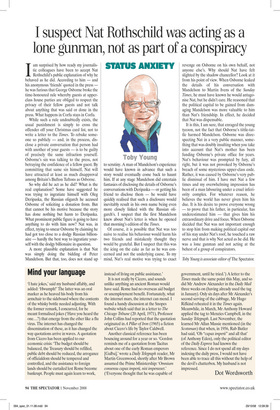I suspect Nat Rothschild was acting as a lone gunman, not as part of a conspiracy
Iam surprised by how ready my journalistic colleagues have been to accept Nat Rothschild’s public explanation of why he behaved as he did. According to him — and his anonymous ‘friends’ quoted in the press — he was furious that George Osborne broke the time-honoured rule whereby guests at upperclass house parties are obliged to respect the privacy of their fellow guests and not talk about anything that was said or done in the press. What happens in Corfu stays in Corfu.
While such a rule undoubtedly exists, the usual punishment is simply to cross the offender off your Christmas card list, not to write a letter to the Times. To rebuke someone so publicly — and, in the process, disclose a private conversation that person had with another of your guests — is to be guilty of precisely the same infraction yourself. Osborne’s sin was talking to the press, not betraying the confidence of a fellow guest. By committing that same sin himself, Nat will have attracted at least as much disapproval among Britain’s Bufton Tuftons as Osborne.
So why did he act as he did? What is the real explanation? Some have suggested he was trying to ingratiate himself with Oleg Deripaska, the Russian oligarch he accused Osborne of soliciting a donation from. But that cannot be his motive because the story has done nothing but harm to Deripaska. What prominent public figure is going to have anything to do with him now? Nat was, in effect, trying to smear Osborne by claiming he had got too close to a dodgy Russian billionaire — hardly the best way to ingratiate yourself with the dodgy billionaire in question.
A more plausible explanation is that Nat was simply doing the bidding of Peter Mandelson. But that, too, does not stand up to scrutiny. A man of Mandelson’s experience would have known in advance that such a story would eventually come back to haunt him. If at any stage Mandelson did entertain fantasies of disclosing the details of Osborne’s conversations with Deripaska — or getting his friend to disclose them — he would have quickly realised that such a disclosure would inevitably result in his own name being even more closely linked with the Russian oligarch’s. I suspect that the first Mandelson knew about Nat’s letter is when he opened that morning’s edition of the Times.
Of course, it is possible that Nat was too naive to realise his behaviour would harm his two friends and mistakenly thought they would be grateful. But I suspect that this was the icing on the cake as far as he was concerned and not the underlying cause. To my mind, Nat’s real motive was trying to exact revenge on Osborne on his own behalf, not anyone else’s. Why should Nat have felt slighted by the shadow chancellor? Look at it from his point of view. When Osborne leaked the details of his conversation with Mandelson to Martin Ivens of the Sunday Times, he must have known he would antagonise Nat, but he didn’t care. He reasoned that the political capital to be gained from damaging Mandelson was more valuable to him than Nat’s friendship. In effect, he decided that Nat was dispensable.
It is this, I am sure, that enraged the young tycoon, not the fact that Osborne’s tittle-tattle harmed Mandelson. Osborne was disrespecting Nat in a very public manner, something that was doubly insulting when you take into account that Nat’s mother has been funding Osborne’s private office for years. Nat’s behaviour was prompted by fury, all right, but it was not provoked by Osborne’s breach of some mysterious upper-class code. Rather, it was caused by Osborne’s very public dismissal of him. I have met Nat a few times and my overwhelming impression has been of a man labouring under a cruel inferiority complex. For whatever reason, he believes the world has never given him his due. It is his desire to prove everyone wrong — to prove that his father, in particular, has underestimated him — that gives him his extraordinary drive and focus. When Osborne decided that Nat was not important enough to stop him from making political capital out of his stay under Nat’s roof, he touched a raw nerve and that is why Nat acted as he did. He was a lone gunman and not acting at the behest of a group of conspirators.


































































































 Previous page
Previous page